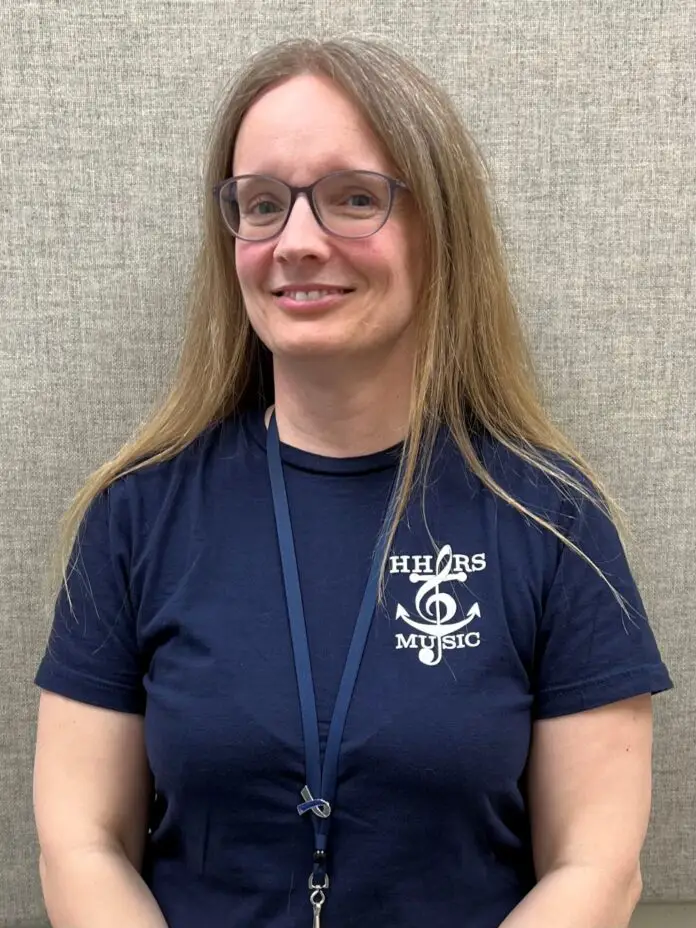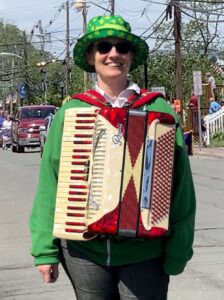Life The Henry Hudson Regional faculty member Denise Furda who had her Osprey Chorus singing the Highlands Elementary School song during the St. Patrick’s Day parade brings similar enthusiasm to classes she teaches in all three schools of the regional district.
Mrs.Furda, who has been the music teacher at the Highlands Elementary school since 2002 when she first came aboard to teach general music, band and chorus in Highlands, also began teaching band at the Atlantic Highlands Elementary school in September 2017.
Now, with the regionalization including all thee schools in a single district, she is now in each of schools, including Henry Hudson where she teaches general music and instrument lessons to 7th graders, in addition to her band classes in both elementary schools and her chorus class in Highlands.
A heavy schedule, but one this hardworking teacher loves for many reasons. “l love when a student reaches a goal they have set for themselves,” she enthused, “In fact, I just invited a student, who has been working really hard this year, to join the Osprey Band at HES. He got a big smile on his face, so I put my hand up for a high-five, but he ran over and gave me a big hug instead. He was so excited! It was a great moment! “
You might say music is this teacher’s life, or at least a great part of it! Graduating magnum cum laude from the Crane School of Music at SUNY in Potsdam, NY, in 2001, she holds a degree in music education with a concentration on vocal. But she plays numerous instruments, her favorite being the piano.
I can play all of the instruments I teach at at least middle school level, she said, “although flute is my main band instrument. “ She also plays the oboe in the Greater Shore Concert Band, is the Director of Music at the First United Methodist Church in Oakhurst, where she plays the organ and leads the Choir and Praise Team. She’s also skillful in ringing and teaching hand bells.
The teacher said she has always had something musical in her life but admits to enjoying bowling as well and is proud of her accomplishments there. “I’m having my best year ever with a 178 average,” she boasted.
Married, living in Oakhurst and the mother of three sons, one who has passed, and two teenagers, Mrs. Furda believes music is an important part of every child’s life and aids them in learning about history, other cultures, language, and even math. “Students learn about history and cultures through learning about composers, learning rhythm helps with math, reading music notation helps with language, and in both band and chorus, students learn to work not only independently but also in a group, and how sometimes it takes time working towards a goal and achieving it.
She believes all children like “at least listening to music,” even if they aren’t interested in performing it. But for all, one of the best parts of music, she believes, is that it connects people with their emotions. “An upbeat, happy song definitely brings a smile to my students’ faces.” She said, by way of example, “I once had a student request to sing “Bad Day” . She said it helped her get through a rough patch of life. We did sing it, and other students commented that they related to it too. “
Although she aims for a variety of music styles in her concerts, the music instructor said she generally expects students “to like the upbeat, fun piece the most; still, “often there will be student requests for us to start with the soft, calm piece.”
The downside, or most frustrating part of teaching music for this teacher is “when I know a student is not doing as well as they could. I have to figure out what they need to find the inspiration to reach their best potential.
Sometimes, it’s a particular song they click with or the right compliment which may inspire them. “ She works until she achieves that goal, and her student has improved and enjoyed the experience of learning.
The new regionalization of the three schools has distinct advantages for music, Mrs. Furda believes. “Our students begin their musical journey with Mrs. Jennifer Wolff in the elementary school general music classes, then may have instrument lessons from me in fourth grade. Moving up they then work with Nicholas McGill at the high school level. “
At the elementary instrument lesson classes, she teaches flute, clarinet, alto saxophone, tenor saxophone, trumpet, trombone, baritone horn, pitched and non-pitched percussion. In her 7th grade general music class, Mrs. Furda teaches basic music notation, beginning piano, and beginning guitar. Students learn a few chords on each instrument and play a few simple songs using those chords. She places emphasis on teaching a student to read music, learning that is the easiest way to learn to play an instrument.
Students tend to want to write something in their music to help them remember, something she does not allow until they come close to a concert presentation. “If you write in names of notes or counting the rhythm right away, you lose the opportunity to learn to read those notes and rhythms, “ she explains. But once in performance mode, if a student is still missing a note or rhythm, she permits them to write in the music so that the performance of the piece is better.
For herself, this busy happy teacher blames Weird Al Yankovic for her ability and love for the accordion. “I am a huge fan of “Weird Al” Yankovic, the accordion rock star,” she explains Besides that, I grew up singing with Village Harmony summer camp where I learned songs from the Balkan countries usually accompanied by an accordion. I usually play it for the annual parade and the occasional school-talent show, when I dress up as Weird Al and perform his song “Yoda”.




